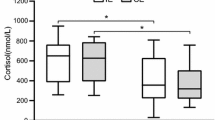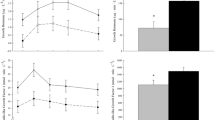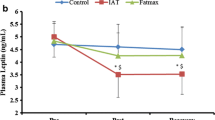Abstract
This study investigated the leptin response to vigorous exercise. We examined 12 sedentary subjects (7 males and 5 females) aged 45-59 yr (53±6.3) with body mass index of 26.1±8 Kg/m2. The selection of the population was based on the absence of endocrine or any other pathological anomaly. Basal concentrations of leptin, cortisol, insulin and glucose were measured at 08:00 h after an overnight fast. After that the individuals were placed on a computercontrolled ergometer performing a 20-min run at 70% V02 max under controlled environmental conditions. Blood samples were obtained immediately after the completion of the test. For the following hour, all subjects were placed in the supine position and blood samples were taken at the end of the time period. Statistical evaluation was performed using analysis of variance (ANOVA) for independent variables. Plasma leptin levels exhibited a statistically significant decrease at the end of the 20 min running period (1.5±0.1 ng/ml vs 3.2±0.4 ng/ml, p<0.005). Interestingly, after 1 h in the supine position, leptin levels reached the basal values (3.17±0.1 ng/ml). The concentration of insulin, glucose and cortisol were unaltered during the exercise test (9.8±1.3 vs 8.85±1.27 gMIU/ml, 95.58±6.71 mg/dl vs 98.4±0.78 mg/dl and 10.35±0.74 gMg/dl vs 9.5±0.7 gMg/dl respectively). In conclusion, our data demonstrate a relationship between stressful physical activity and plasma leptin levels in middle- aged subjects.
Similar content being viewed by others
References
Perusse L, Collier G, Gagnon J, et al. Acute and chronic effects of exercise on leptin levels in humans. J Appl Physiol 1997, 83: 5–10.
Jequier E. Leptin signaling, adiposity, and energy balance. Ann N Y Acad Sci 2002, 967: 379–88. Review.
Hofbauer KG. Molecular pathways to obesity. Int J Obes Relat Metab Disord 2002, 26 (Suppl 2): S18–27.
Reseland JE, Anderssen SA, Solvoll K, et al. Effect of long—term changes in diet and exercise on plasma leptin concentrations. Am J Clin Nutr 2001, 73: 240–5.
Hickey MS, Considine RV, Israel RG, et al. Leptin is related to body fat content in male distance runners. Am J Physiol 1996, 271: 938–40.
Hickey MS, Calsbeek DJ. Plasma leptin and exercise: recent findings. Sports Med 2001, 31: 583–9.
Pasman WJ, Westerterp-Platenga MS, Saris WHM. The effect of exercise training on leptin levels in obese males. Endocrinol Metab 1998, 274: E280–6.
Hilton LK, Loucks AB. Low energy availability, not exercise stress, suppresses the diurnal rhythm of leptin in healthy young women. Am J Physiol Endocrinol Metab 2000, 278: E43–9.
Racette SB, Coppack SW, Landt M, Klein S. Leptin production during moderate-intensity aerobic exercise. J Clin Endocrinol Metab 1997, 82: 2275–7.
Maffeis C. Aetiology of overweight and obesity in children and adolescents. Eur J Pediatr 2000, 159 (Suppl 1): S35–44.
Duclos M, Corcuff JB, Ruffie A, Roger P, Manier G. Rapid leptin decrease in immediate post-exercise recovery. Clin Endocrinol (Oxf) 1999, 50: 337–42.
Zheng D, Wooter MH, Zhou Q, Dohm GL. The effect of exercise on ob gene expression. Biochem Biophys Res Commun 1996, 225: 747–50.
Di Carlo C, Tommaselli GA, Nappi C. Effects of sex steroid hormones and menopause on serum leptin concentrations. Gynecol Endocrinol 2002, 16:479–91.
Carr MC. The emergence of the metabolic syndrome with menopause. J Clin Endocrinol Metab 2003, 88: 2404–11.
Cusin I, Sainsbury A, Doyle P, Rohner-Jeanrenaud F, Jeanrenaud B. The ob gene and insulin. A relationship leading to clues to the understanding of obesity. Diabetes 1995, 44: 1467–70.
Saladin R, De Vos P, Guerre-Millo M, et al. Transient increase in obese gene expression after food intake or insulin administration. Nature 1995, 377: 527–9.
Dagogo-Jack S, Fanelli C, Paramore D, Brothers J, Landt M. Plasma leptin and insulin relationships in obese and nonobese humans. Diabetes 1996, 45: 695–8.
Vidal H, Auboeuf D, De Vos P, et al. The expression of ob gene is not acutely regulated by insulin and fasting in human abdominal subcutaneous adipose tissue. J Clin Invest 1996, 98: 251–5.
Leal-Cerro A, Garcia-Luna PP, Astorga R, et al. Serum leptin levels in male marathon athletes before and after the marathon run. J Clin Endocrinol Metab 1998, 83: 2376–9.
Kolaczynski JW, Ohannesian JP, Considine RV, Marco CC, Caro JF. Response of leptin to short-term and prolonged overfeeding in humans. J Clin Endocrinol Metab 1996, 81: 4162–5.
Landt M, Lawson GM, Helgeson JM, et al. Prolonged exercise decreases serum leptin concentrations. Metabolism 1997, 46: 1109–12.
Tuominen JA, Ebeling P, Laquier FW, Heiman ML, Stephens T, Koivisto VA. Serum leptin concentration and fuel homeostasis in healthy man. Eur J Clin Invest 1997, 27: 206–11.
Legro RS, Finegood D, Dunaif A. A fasting glucose to insulin ratio is a useful measure of insulin sensitivity in women with polycystic ovary syndrome. J Clin Endocrinol Metab 1998, 83: 2694–8.
Ebeling P, Bourey R, Koranyi L, et al. Mechanism of enhanced insulin sensitivity in athletes. Increased blood flow, muscle glucose transport protein (GLUT-4) concentration, and glycogen synthase activity. J Clin Invest 1993, 92: 1623–31.
De Vos P, Saladin R, Auwerx J, Staels B. Induction of ob gene expression by corticosteroids is accompanied by body weight loss and reduced food intake. J Biol Chem 1995, 270: 15958–61.
Papaspyrou-Rao S, Schneider SH, Petersen RN, Fried SK. Dexamethasone increases leptin expression in humans in vivo. J Clin Endocrinol Metab 1997, 82: 1635–7.
Yanovski JA, Yanovski SZ, Boyle AJ, et al. Hypothalamic-pituitary- adrenal axis activity during exercise in African American and Caucasian women. J Clin Endocrinol Metab 2000, 85: 2660–3.
Author information
Authors and Affiliations
Corresponding author
Rights and permissions
About this article
Cite this article
Legakis, I.N., Mantzouridis, T., Saramantis, A. et al. Rapid decrease of leptin in middle-aged sedentary individuals after 20 minutes of vigorous exercise with early recovery after the termination of the test. J Endocrinol Invest 27, 117–120 (2004). https://doi.org/10.1007/BF03346255
Accepted:
Published:
Issue Date:
DOI: https://doi.org/10.1007/BF03346255




